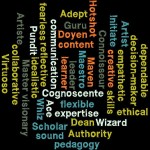Early in November approximately 150 stakeholders gathered at the Grand Canyon for the 103rd Arizona Town Hall. The topic was Early Education In Arizona. Between meals featuring experts talking about topics as wide ranging as brain science and the rate-of-return on investments in early childhood programs, the participants met in five groups to develop answers to questions like, “What is the state of early childhood in Arizona?” and “What resources can be developed to improve aarly childhood in Arizona?” Recorders compiled a composite report of the groups’ responses and after some amending in a plenary session, a consensus was reached for a final document.
Following are my thoughts about Early Childhood, as informed by my observations at the event.
The Great Divide
There is a distinct divide between early early childhood, from pre-birth to 5 years, and early childhood from 6 years to 8 years.
Caregivers in the early range like to be considered teachers and very often should be. Yet there are few requirements regarding certification of childcare centers or their employees. Quite a few advocates call for ramping up the requirements, particularly promoting a policy by which childcare workers should have college degrees. Others argue that such policies would make childcare prohibitively expensive.
Many members in my group favored compulsory education beginning at four years old, or even younger, but just as many were against the idea.
The Great Union
There was absolute agreement in my group that everyone benefits when all children have access to enriching and stimulating Early Childhoods. There was near absolute agreement that the state has an interest, if not an obligation, in providing access to an enriching early childhood education to all children.
Watch Your Language
One member in my group advocated over and over the need to learn how to speak to lawmakers in their own language. Advocating for a cause without having specific, actionable policies in mind is a nonstarter.
Be careful not to call anything “daycare” – someone will quickly point out that what’s being cared for is children, not days.
And watch how you say early childhood starts. Proabortionists bristle at “pre-birth.”
Advanced Degrees Versus National Board
There was broad agreement that a highly educated early childhood workforce is a good thing and that for-profits, non-profits, and state agencies should form partnerships to support teachers as they pursue advanced degrees. But there was a general lack of knowledge about pursuing National Board Certification as a means to develop one’s practice. The final report was amended to include National Board Certification on equal standing with advanced degrees, in terms of professional development.
Teacher Status
Participants largely want teachers to be better compensated. There was pushback to the notion that teachers have a place in policy-making, but an amendment was added in the final session promoting teacher participation in policy decisions.
Use and Abuse of “Brain Science”
Proper reference to neurologic studies on brain development and early childhood environments persuades; saying “brain science says…” does not.
Final Thoughts
I’m not sure how much influence the Arizona Town Hall has. They claim to make a difference with policy-makers, and I’ve no reason to doubt that. I learned a great deal about the opinions and causes people outside of the K-12 system, regarding early childhood.
Furthermore, I learned plenty about early childhood, itself – enough, at least, to say, “I now know what I don’t know.”
(The Report of the 103rd Town Hall – “Early Education in Arizona” can be found here. The background report, Strong Start – Early Childhood Education in Arizona can be found here. The image in the post came from the background report.)









